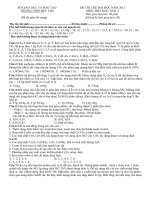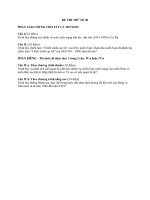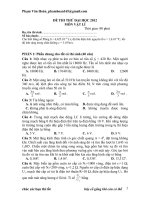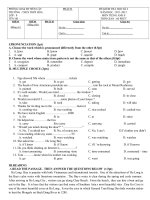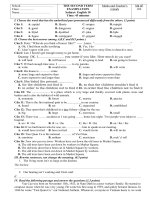de thi hk2Anh vannam 2012 de 2lop11
Bạn đang xem bản rút gọn của tài liệu. Xem và tải ngay bản đầy đủ của tài liệu tại đây (104.71 KB, 3 trang )
<span class='text_page_counter'>(1)</span><div class='page_container' data-page=1>
Dateh Ethnic Minority Boarding High School Code: 1
Name: Class:11A
THE SECOND SEMESTER EXAMINATION
Grade:11(2011-2012)
Mark Teacher’s Comment Mã đề
207
<b>I. Pick out the word whose underlined and bold part is pronounced differently from that of the </b>
<b>other words.</b>
<b>Câu 1: </b>
<i><b>A. ch</b></i>
aracter
<b>B. </b>
s
<i><b>ch</b></i>
edule
<i><b>C. ch</b></i>
arity
<i><b>D. ch</b></i>
icken
<b>Câu 2: </b>
<b>A. </b>
d
<i><b>i</b></i>
fficulty
<b>B. </b>
determ
<i><b>i</b></i>
nation
<i><b>C. i</b></i>
mportance
<b>D. </b>
des
<i><b>i</b></i>
re
<b>Câu 3: </b>
<b>A. </b>
d
<i><b>a</b></i>
ddy
<i><b>B. a</b></i>
ny
<b>C. </b>
ch
<i><b>a</b></i>
t
<b>D. </b>
c
<i><b>a</b></i>
t
<b>Câu 4: </b>
<b>A. </b>
promis
<b>ed</b>
<b>B. </b>
caus
<b>ed</b>
<b>C. </b>
increas
<b>ed</b>
<b>D. </b>
practic
<b>ed</b>
<b>II. Choose the best answer among A, B, C or D that best completes each sentence.</b>
<b>Câu 5:</b>
The boy to...I lent my money is poor.
<b>A. </b>
whom
<b>B. </b>
that
<b>C. </b>
whose
<b>D. </b>
who
<b>Câu 6:</b>
"Have you ever met the man...over there?" "No. Who is he?
<b>A. </b>
stands
<b>B. </b>
is standing
<b>C. </b>
standing
<b>D. </b>
who he is standing
<b>Câu 7:</b>
I have heard nothing from him since...
<b>A. </b>
he left
<b>B. </b>
he leaves
<b>C. </b>
he has left
<b>D. </b>
he had left
<b>Câu 8:</b>
A fund will be set up for the...species.
<b>A. </b>
endangering
<b>B. </b>
dangerous
<b>C. </b>
endangered
<b>D. </b>
popular
<b>Câu 9:</b>
We spent a month...this table.
<b>A. </b>
make
<b>B. </b>
to make
<b>C. </b>
making
<b>D. </b>
made
<b>Câu 10: The football match was so dull that most of the _____ left at half-time.</b>
<b>A. spectators</b>
<b>B. audiences</b>
<b>C. participants</b>
<b>D. attendants</b>
<b>Câu 11: _____ volleyball players, footballers cannot use their hands in the game.</b>
<b>A. Opposite</b>
<b>B. Different</b>
<b>C. Like</b>
<b>D. Unlike</b>
<b>Câu 12: No one took part in the competition, _____?</b>
<b>A. did he</b>
<b>B. didn't they</b>
<b>C. didn't he</b>
<b>D. did they</b>
<b>Câu 13: Do you know the date ______ we have to hand in the essay?</b>
<b>A. when</b>
<b>B. on that</b>
<b>C. which</b>
<b>D. in which</b>
<b>Câu 14:</b>
“Do you remember Mrs. Goddard,...taught us English composition?” “I certainly do”
<b>A. </b>
which
<b>B. </b>
whom
<b>C. </b>
who
<b>D. </b>
that
<b>Câu 15: Thomas Eakins studied not only painting ______ anatomy when he was training to become an artist.</b>
<b>A. and</b>
<b>B. but also</b>
<b>C. as well</b>
<b>D. moreover</b>
<b>Câu 16: I don't have much money, so I bought the camera _____.</b>
A. newly D. second-hand C. immediately D. profitably
<b>III. Choose the underlined part among A, B, C or D that needs correcting.</b>
<b>Câu 17: John lived </b>
<b>in</b> New York <b>since</b> 1960 to 1975, but he <b>livesin</b> Boston now.A B C D
<b>Câu 18: They asked me </b>
<b>what did happenlast night</b>, but I was <b>unable</b> to <b>tell them</b>.A B C D
<b>Câu 19: I do not know </b>
<b>wherecould he have</b> gone <b>so earlyin</b> the morning.A B C D
<b>Câu 20: We thought he </b>
<b>is</b> planning <b>to go on holidayafter</b> the <b>first</b> of the month.A B C D
</div>
<span class='text_page_counter'>(2)</span><div class='page_container' data-page=2>
<b>Câu 21:</b>
I didn't have an umbrella with me, so I got wet.
<b>A. </b>
If I had had an umbrella, I wouldn't get wet.
<b>B. </b>
If I had had an umbrella, I would get wet.
<b>C. </b>
If I had had an umbrella, I would have got wet.
<b>D. </b>
If I had had an umbrella, I wouldn't have got wet.
<b>Câu 22: In the class of twenty, Jeanne is the third best student.</b>
<b>A. Jeanne is not as smart as most of the other students.</b>
<b>B. The class has only three smart students.</b>
<b>C. No other student is as smart as Jeanne.</b>
<b>D. Two students are smarter than Jeanne.</b>
<b>Câu 23:</b>
<i> There are a lot of people. The people like to do things together.</i>
<b>A. </b>
There are a lot of people who like to do things together.
<b>B. </b>
There are a lot of people who like do things together.
<b>C. </b>
There are a lot of people whom like to do things together.
<b>D. </b>
There are a lot of people like to do things together.
<b>Câu 24:</b>
<i> "I have lost my passport," said Mary.</i>
<b>A. </b>
Mary advised me not to lose her passport.
<b>B. </b>
Mary told me to take her passport.
<b>C. </b>
Mary said she had lost her passport.
<b>D. </b>
Mary said her passport was new.
<b>V. Choose the word or phrase among A, B, C or D that best fits the blank space in the following</b>
<b>passage:</b>
El Nino is weather phenomenon of the Pacific Ocean which is caused by an abnormal warming of water on the
surface of the ocean. It has the power to influence global weather patterns as it brings drought to some continents
and ([<25>])... rain to others. It was first noticed by fishermen coming from Spanish ports in the Pacific in the
17th<sub> century. It got its name (Spanish for 'boy child') because it usually takes ([<26>])... near Christmas time. It</sub>
can cause catastrophic damage The 1982 El Nino ([<27>])... in 1,500 deaths, but it can be a lot worse than that.
Sea animals, including fish and birds, also die in large numbers. It is ([<28>])...that sailors in the Pacific can
smell the dead sea-life during El Nino.
<b>Câu 25: A. </b>
part
<b>B. </b>
place
<b>C. </b>
care
<b>D. </b>
away
<b>Câu 26: A. </b>
gave
<b>B. </b>
led
<b>C. </b>
resulted
<b>D. </b>
caused
<b>Câu 27: A. </b>
heavy
<b>B. </b>
shower
<b>C. </b>
wet
<b>D. </b>
plenty
<b>Câu 28: A. </b>
felt
<b>B. </b>
mistaken
<b>C. </b>
said
<b>D. </b>
told
<b>VI. Read the passage carefully, then choose the correct answer.</b>
The hobby of collecting consists of acquiring specific items based on a particular interest of the collector. These
collections of things are often highly organized, carefully cataloged, and attractively displayed. Since collecting
depends on the interests of the individual collector, it may deal with almost any subject. The depth and breadth of
the collection may also vary. Some collectors choose to focus on a specific subtopic within their area of general
interest: for example, 19th Century postage stamp, milk bottle labels from Sussex, or Mongolian harnesses and
tack. Others prefer to keep a more general collection, <b>accumulating</b> Star Trek merchandise, or stamps from all
countries of the world. Some collections are capable of being completed, at least to the extent of owning one
sample of each possible item in the collection (e.g. a copy of every book by Agatha Christie). Collectors who
specifically try to assemble complete collections in this way are sometimes called “completist”. Upon completing a
particular collection, they may stop collecting, expand the collection to include related items, or begin an entirely
new collection. The most popular fields in collecting have specialized commercial dealers that trade in the items
being collected, as well as related accessories. Many of these dealers started as collectors themselves, then turned
their hobby into a profession. There are some limitations on collecting, however. Someone who has the financial
means to collect stamps might not be able to collect sport cars, for example. .
<b>Câu 29: What do collectors do when they have completed their collections?</b>
<b>A. They continue to collect related items.</b>
<b>B. They sell their collections.</b>
<b>C. They begin to collect the more expensive things.</b>
<b>D. They become specialized dealers</b>
<b>Câu 30: The word </b>
<b>“accumulating”</b> in the passage can best be replaced by .<b>A. taking on</b>
<b>B. bringing in</b>
<b>C. carrying on</b>
<b>D. building up</b>
<b>Câu 31: Collecting may deal with almost any subject because</b>
<b>A. it is often classified into different categories</b>
</div>
<span class='text_page_counter'>(3)</span><div class='page_container' data-page=3>
<b>D. it is based on a particular interest of the collector.</b>
<b>Câu 32: Which of the following is not mentioned in the passage as a collector's item?</b>
<b>A. stamps</b>
<b>B. books</b>
<b>C. goods</b>
<b>D. accessories</b>
<b>VII. Rewrite the following sentences. </b>
<b>33</b>. Columbus sailed to America in 1492. ( cleft sentence)
<i>………</i>
<b>34</b>. The president makes the important decisions. ( cleft sentence)
<i>………</i>
<b>35</b>. He was the first man who left the burning building.(Relative clauses replaced by <b>to inf</b>)
<i>………</i>
<b>36.</b> The couples who live in the house next door are both college professors. (Relative clauses replaced by <b>Ving</b>)
<i>………</i>
<b>VIII. Add tag questions to the following statements.</b>
<b> 37</b>. Nobody liked the play, ……….?
<b>38.</b> Don't touch that button, ……….?
<b>39.</b> I'm too late, ………?
<b>40.</b> Let's go out for dinner tonight, ……….….?
</div>
<!--links-->
